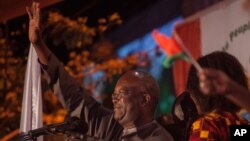A few minutes after the official announcement of his victory in Sunday's presidential election in Burkina Faso, Roch Marc Chrisitian Kabore spoke to a gathering of supporters and made sure to repeat a campaign pledge.
"To the youth, to the women and to the elderly," he said, "I would like to say that I'm determined to implement my political program to open the opportunities for a better tomorrow."
Gathering more than half the vote in a first-round victory, Kabore convinced voters that he could bring some fresh air to the West African nation, a year after massive protests ended former President Blaise Compaore's 27-year rule, and despite the fact that he served in Compaore's governments for 25 years.
Voter Abdul Fatah Bogodo said he thought Kabore was different, precisely because he decided to leave the ruling party after he disagreed with Compaore's actions.
Compaoré's regime was a corrupt dictatorship, Bogodo said, adding that Kabore would put everything back in order.
Voter Moussa Nadembega also said he trusted Kabore but wouldn't be satisfied until changes were apparent.
Nadembega said Kabore "has a big burden on his shoulders. We just came out of the insurrection and the transition period. I think he has a lot of work ahead of him."
Daniel Eizenga, an associate researcher with the Sahel Research Group, an organization at the University of Florida focused on political, social, economic and cultural dynamics of the countries of the West African Sahel, said Kabore's policies "look very similar to the former policies and ideologies of the CDP," Compaore's party.
On the same day that the Burkinabe chose their new president, they also were asked to choose their parliament; results were expected to be announced by Wednesday.
Eizenga said the composition of the new parliament would be key to the new president's party, the MPP, being able to govern effectively.
"The way the MPP broke with the CDP in the past means that the MPP has some immediate political adversaries," he said. "The MPP could face some challenges against a very strong opposition in the national assembly."
Kabore's main opposition in parliament is likely to be the UPC, the party of longtime opposition leader Zephirin Diabre, who came in second in the presidential poll with 29 percent of the vote.





